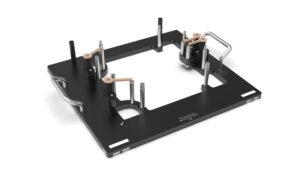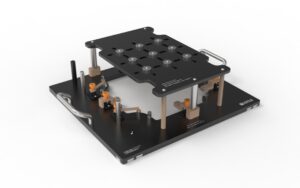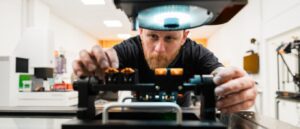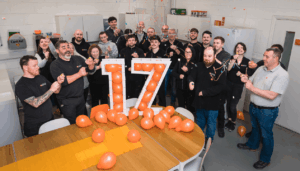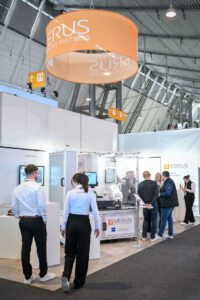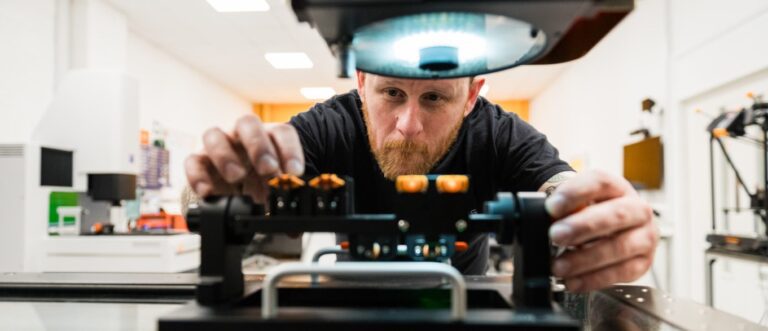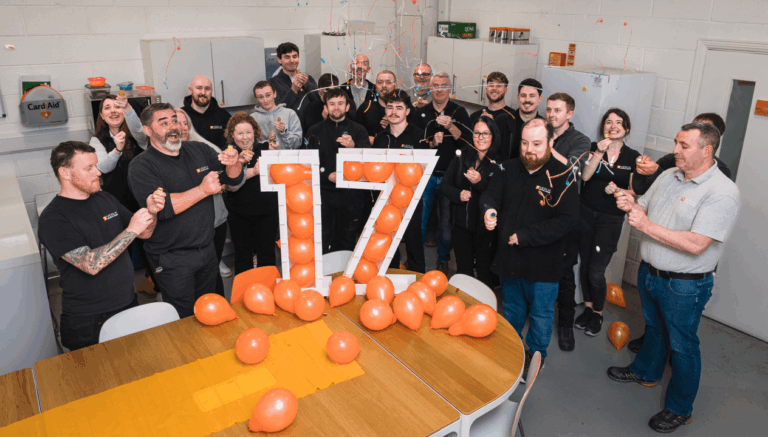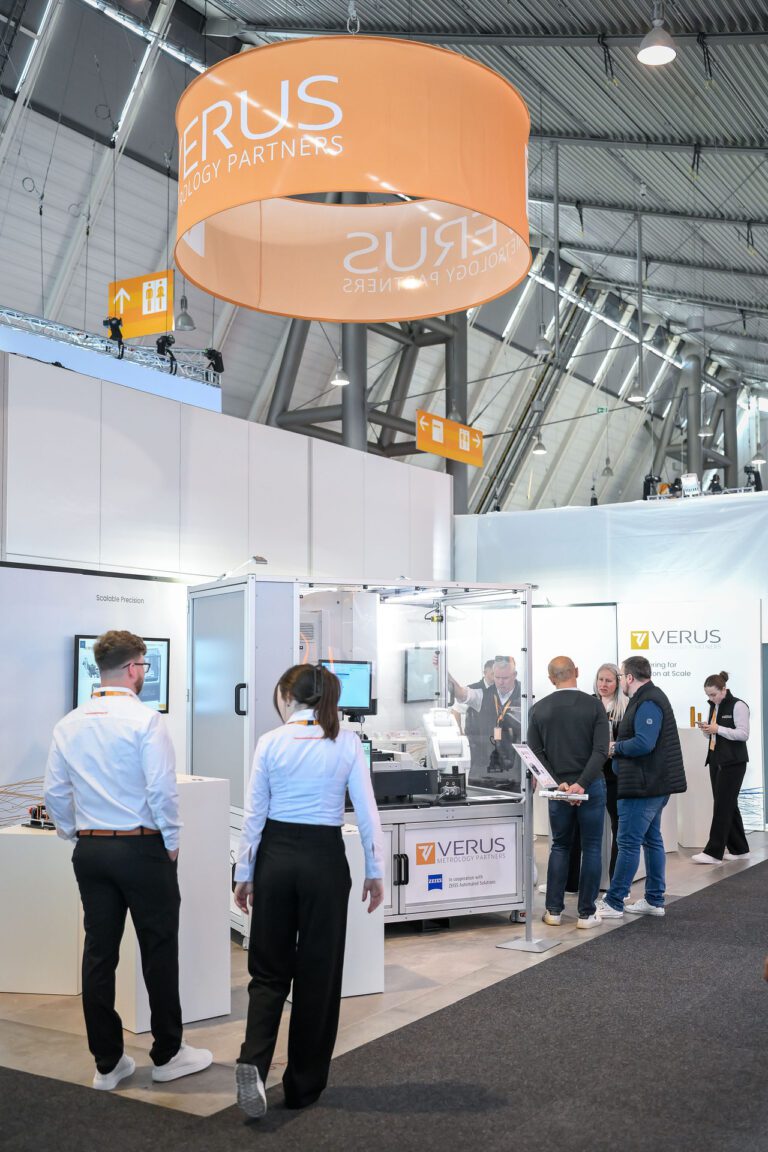Overview
Filling medical syringes on an automated production line at high-speed demands a high-volume, multi-syringe carrier that won’t be adversely affected by the loading process or the operating environment. Medical-grade container manufacturer SiO2 turned to Verus Metrology Partners to prove that an all-new syringe carrier was more than capable of handling the task it was designed for.
Background
SiO2 Materials Science develops and manufactures medical-grade containers based on its proprietary technology platform that brings together all the benefits of glass and plastic without any of their drawbacks. Its products are a key enabler in the packaging and distribution of even the most sensitive of biological drugs.
The culmination of more than 10 years and $500m in R&D, the company’s syringes, vials and tubes are molded from engineered polymers and incorporate a microscopically-thin, glass-like barrier coating on the inner surface. SiO2 products won’t break or leak, and withstand extreme physical, thermal and chemical abuse.
SiO2 containers have had a far-reaching impact on our lives. They successfully eliminate all kinds of contaminants associated with immunogenic responses, and ensure an oxygen and moisture barrier with a thermal stability down to -196ºC. They exhibit no delamination over time, and are unbreakable in all filling line or supply chain scenarios.
Protected by more than 300 worldwide patents covering close to 8,000 patent use claims, the SiO2 material technology platform is currently used in a range of vitally important industry sectors including: pharma and biotech, molecular diagnostics and consumer healthcare.
Manufacturing innovative medical-grade containers in their billions, and often on very short lead times, SiO2 Material Science invests heavily in industrial metrology to ensure its containers and respective carriers are delivered process-line ready-to-go and guaranteed easy to fill.
The Challenge
SiO2 Materials Science develops and manufactures medical-grade containers based on its proprietary technology platform that brings together all the benefits of glass and plastic without any of their drawbacks. Its products are a key enabler in the packaging and distribution of even the most sensitive of biological drugs.
The culmination of more than 10 years and $500m in R&D, the company’s syringes, vials and tubes are molded from engineered polymers and incorporate a microscopically-thin, glass-like barrier coating on the inner surface. SiO2 products won’t break or leak, and withstand extreme physical, thermal and chemical abuse.
SiO2 containers have had a far-reaching impact on our lives. They successfully eliminate all kinds of contaminants associated with immunogenic responses, and ensure an oxygen and moisture barrier with a thermal stability down to -196ºC. They exhibit no delamination over time, and are unbreakable in all filling line or supply chain scenarios.
Protected by more than 300 worldwide patents covering close to 8,000 patent use claims, the SiO2 material technology platform is currently used in a range of vitally important industry sectors including: pharma and biotech, molecular diagnostics and consumer healthcare.
Manufacturing innovative medical-grade containers in their billions, and often on very short lead times, SiO2 Material Science invests heavily in industrial metrology to ensure its containers and respective carriers are delivered process-line ready-to-go and guaranteed easy to fill.
The Solution
Through an iterative design and manufacturing process, SiO2 arrived at a final syringe carrier design supporting 160 syringes in five sizes, ranging from 0.5ml to 3mL. Injection molded in a pliable polypropylene plastic, the carrier is effectively a fixed matrix of 160 adjoining wells, with edge space included for manual fixture clamping and automated suction cup handling.
For the close inspection and measurement of the new carrier, Lantz turned to trusted collaborator, Verus Metrology Partners. He said, “In this particular job, it wasn’t just a case of ‘fixture and inspect’. There was a ‘simulation’ element to it that added a level of complexity. It required in-depth experience of medical container handling, and a true turnkey capability. Verus brings us that.”
In order to deliver the data SiO2 wanted for all critical carrier dimensions, Verus designed and built an innovative two-stage fixturing solution.
With a base plate CNC-machined in 10mm-gauge black anodised aluminium, the Stage 1 fixture integrated precision-machined stainless steel carrier support pillars, stainless steel carrier locator pins and carrier retaining clamps CNC machined in high-resilience PEEK plastic. See Figure 1.
Shown in Figure 2, the Stage 2 fixture then comprised an array of 160 free-moving pins, each simulating the actual weight of the contents of a filled syringe. Suspended above the Stage 1 fixture, each Stage 2 pin applies its weight directly to the corresponding syringe in the carrier held below, ensuring that no external force is applied to the carrier itself.
To accommodate the five different syringe sizes, five separate Stage 2 fixtures – to be known as weighting plates- were produced, respectively simulating the five different loaded contents. Importantly, each weighting plate included a viewing aperture at its centre to enable measurement of carrier deflection with syringes loaded and simulated content weight applied.
For SiO2’s Micro-Vu camera-based measurement system, Verus wrote the custom metrology program to accompany the two-stage fixturing, measuring all critical carrier dimensions. These included carrier outer dimensions, upper and lower diameters of the 160 syringe wells as well as the centre-point carrier deflection.
The metrology program was installed and commissioned by Verus engineers from the UK by remote machine interface via a TeamViewer interface. Supporting Gauge R&R (Repeatability & Reproducibility) Type 1 data was also provided.
Result
The innovative turnkey metrology solution developed for SiO2 means that that the company has all the empirical means it needs to prove that its new syringe carrier will meet customer expectations for reliability, irrespective of syringe loading and production line environment.
Lantz said, “Unlike with metals, assuring the flatness, the straightness and stability of an injection-molded plastic part is more problematic. In the case of the new syringe carrier, we knew we had to design to compensate for the possibility of a certain amount of sagging, bowing or expansion. But we still needed to be absolutely sure that a complete nest of loaded syringes would behave itself correctly on our customers’ filling lines.”
He continued, “The metrology solution we now have may appear simple in its elegance, but it’s genius! It tells us exactly how the carrier will perform in the real world. And unlike alternative approaches, which might say sample syringe wells at the outer edge of the nest and a few at the centre, our solution checks every one, every time. This leaves absolutely nothing to guess-work down the line.”
“So we know exactly how much the carrier will deflect and deform from nominal when it’s populated with 160 loaded syringes, and we know that it’s within acceptable tolerances for our customers’ production line handling systems. Automated and robotic handling systems are wonderful things but they don’t like too much variance, so we prove that we can remove it from the equation. This gives our customers the confidence they need before production starts.”
To learn more about our custom fixturing solutions contact Michael Nugent, Chief Operations Officer on +353 (0)71 91 43506 (ext. 215) or Sean Murphy, Group Technical Operations Director on +353 (0)71 91 43506 (ext. 2). To request a quote click here. Moreover, be sure to subscribe to our NEWSLETTER to receive our technical blogs, customer updates and latest developments.

